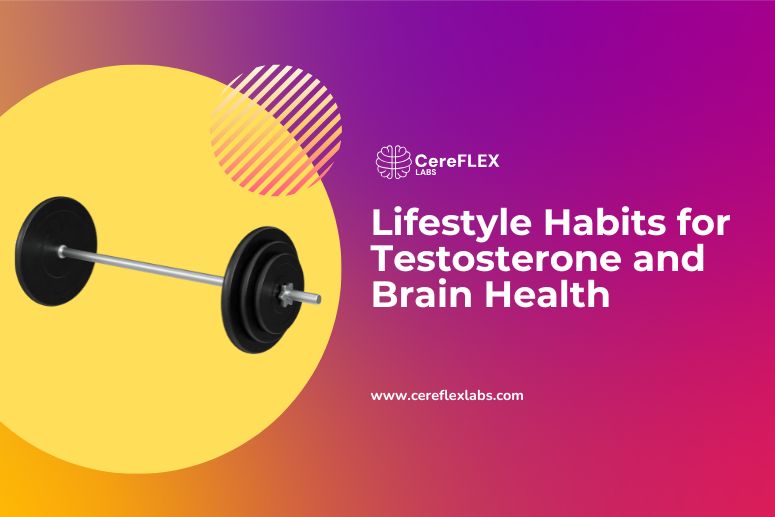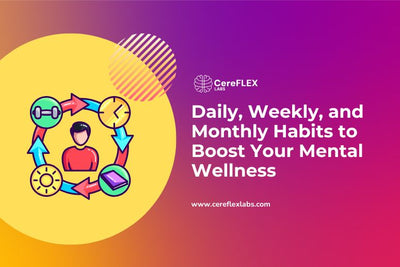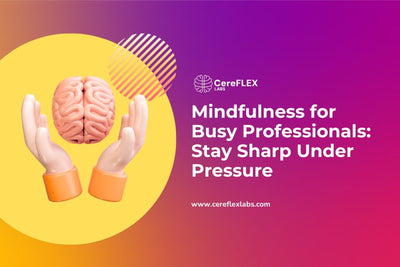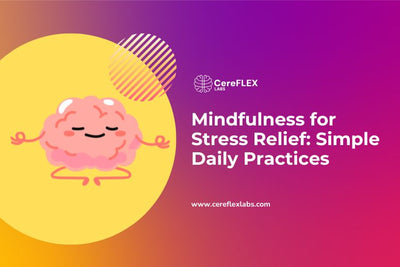Staying energized, focused, and mentally sharp can become more challenging for men between 30 and 65. If you're noticing brain fog, low mood, persistent fatigue, or a drop in libido, it's not just age catching up with you—it could be a sign that your hormones and brain health are out of sync.
Few people realize how closely linked testosterone and brain health are. Testosterone plays a role beyond building muscle and supporting sex drive—it also affects memory, focus, and emotional balance. At the same time, a healthy brain helps regulate hormones, including testosterone, more efficiently.
The upside? Simple, consistent lifestyle changes can help restore this balance. When your brain and hormones support each other, you’ll start to feel stronger, more alert, and emotionally grounded—day after day.

Testosterone is a hormone primarily produced by the testicles in males and, to a lesser extent, by the ovaries in females. A small amount also comes from the adrenal glands, which make a hormone called DHEA—your body can convert this into both testosterone and estrogen.
As the body’s main androgen, testosterone drives the development of male traits and supports a range of essential functions, including muscle growth, libido, and energy levels. Men naturally have much higher levels of testosterone than women.
Why does testosterone matter to the brain?
Testosterone is important for brain health, especially for mood, memory, and spatial thinking. Research shows that it activates brain regions involved in processing and problem-solving, like the ventral stream, which helps you recognize patterns and navigate space.
Men of all ages with low testosterone often experience brain fog or difficulty concentrating. Studies suggest that restoring testosterone to healthy levels—whether naturally or through supervised supplementation—can improve mood, motivation, and mental energy.
In fact, low testosterone has been linked to higher rates of depression. Genetic sensitivity to androgens may play a role, but for many men, treating testosterone deficiency leads to more emotional stability and sharper thinking.
While extremely high levels of testosterone—especially from misuse—can cause aggression in some individuals, moderate levels tend to support positive traits like drive and resilience.
In short, testosterone isn’t just about physical strength or libido. It plays a crucial role in cognitive function and emotional well-being.
How Cognitive Health Supports Hormonal Balance
Good cognitive function doesn’t just respond to hormones—it also helps regulate them. The brain plays a key role in managing the HPG axis, which is the system that controls testosterone production. When brain function is disrupted by stress, poor sleep, or chronic inflammation, this hormonal loop can break down, leading to imbalances.
One of the most important links between the brain and hormones is neuroplasticity—your brain’s ability to adapt and form new pathways over time.
This process depends on healthy hormone levels. Testosterone and estrogen support brain growth and repair, while cortisol—the stress hormone—can interfere when it stays too high for too long.
Consistently elevated cortisol can shrink parts of the brain, impair memory, and reduce testosterone production. Over time, this creates a cycle where stress damages both mental sharpness and hormonal health.
The takeaway? When you take care of your brain—through sleep, mental stimulation, and stress reduction—you’re also protecting your hormones. Each system supports the other.
Dietary Habits That Boost Hormones and Brain Power
What you eat affects far more than just your waistline—it directly influences your hormone levels and cognitive function. Some nutrients are particularly powerful because they support both testosterone production and brain performance.
By prioritizing foods that improve brain function and support cognitive health, you can naturally enhance energy, mood, focus, and mental clarity. From zinc-rich legumes to omega-3 fatty acids, these dietary choices help your body and brain work in sync.
Let’s look at two groups of foods that play a key role: those that support testosterone, and those that strengthen brain health.
Testosterone-Supporting Foods
Eating a balanced diet that includes certain testosterone-friendly foods can naturally boost your hormone levels over time. These foods provide essential nutrients like zinc, vitamin D, magnesium, and healthy fats—all of which support testosterone synthesis, reduce inflammation, and aid hormonal regulation.
We’ll discuss each group of testosterone-boosting foods next, beginning with fatty fish and seafood.

Fatty Fish & Seafood
Fatty fish are among the most effective foods for supporting testosterone levels and overall hormonal balance. They’re rich in three key nutrients that play a role in testosterone production: omega-3 fatty acids, vitamin D, and zinc.
Omega-3s help reduce inflammation, which is important because chronic inflammation can interfere with testosterone synthesis. Vitamin D has been shown to support higher testosterone levels in men who are deficient. And zinc is a mineral essential for testicular function and the regulation of hormone levels.
Including a variety of these in your weekly diet can make a noticeable difference:
- Salmon
- Sardines
- Mackerel
- Tuna
- Oysters
- Clams
- Shrimp
- Fish oil (supplement form)
These foods not only help your body make testosterone but also benefit your heart, brain, and joints—offering wide-ranging support for men’s health.
Dark Leafy Greens
Dark leafy greens are rich in magnesium, a mineral shown to support testosterone activity by lowering oxidative stress in the body. Magnesium can help increase the amount of free testosterone—the form your body can actually use—by reducing the binding of testosterone to proteins like SHBG (sex hormone-binding globulin).
These greens are also packed with antioxidants that protect hormone-producing cells from damage caused by stress or inflammation. Regularly eating these vegetables helps maintain hormone balance and supports energy levels, muscle function, and mental clarity.
Some of the best options to include in your meals:
- Spinach
- Kale
- Collard greens
- Swiss chard
Whether eaten raw in salads or lightly sautéed, these vegetables are a nutrient-dense way to boost testosterone and overall vitality.
Cocoa & Dark Chocolate
Cocoa isn’t just a treat—it also contains nutrients that may support testosterone production. Rich in flavonoids and magnesium, cocoa can help reduce oxidative stress and support the function of Leydig cells, which are responsible for producing testosterone in the testes.
The antioxidants in dark chocolate may also protect testosterone from damage caused by free radicals, particularly when consumed in moderation and with low added sugar.
When choosing cocoa-based foods, look for options that are minimally processed and high in cocoa content:
- Unsweetened cocoa powder
- Cacao nibs
- Dark chocolate (70% or higher, low sugar)
A square of dark chocolate can be a satisfying way to support both hormone health and brain function—without guilt.
Healthy Fats & Cholesterol Sources
Testosterone is made from cholesterol, which means your body needs healthy fats to produce and regulate this key hormone. Diets that are too low in fat can actually reduce testosterone levels over time.
The best sources are monounsaturated fats and select saturated fats from whole foods. These fats help maintain cell membrane integrity, support hormone synthesis, and aid nutrient absorption—especially fat-soluble vitamins like D and A, both essential for hormonal health.
Incorporate a variety of these into your meals:
- Avocados
- Whole eggs
- Olive oil
- Nuts (almonds, walnuts, cashews)
- Grass-fed beef
- Full-fat dairy (in moderation)
- Ghee
These foods not only support testosterone but also offer long-lasting energy, improved brain function, and heart health benefits when eaten in balanced portions.
Legumes & Seeds
Legumes and seeds are excellent plant-based sources of zinc and magnesium, two minerals strongly linked to testosterone production and testicular health. Zinc plays a direct role in maintaining sperm quality and hormone levels, while magnesium supports the activation of testosterone and helps manage stress-related inflammation.
These foods are also rich in fibre, protein, and antioxidants, making them beneficial for heart health, digestion, and blood sugar balance—all of which indirectly support hormonal stability.
Great options to include in your weekly meals:
- Chickpeas
- Lentils
- Black beans
- Peanuts
- Pumpkin seeds
- Cashews
Sprinkle seeds over salads or yogurt, and use legumes as hearty bases for soups, stews, or bowls to keep your hormones and brain fuelled naturally.
Onions & Garlic
Onions and garlic are more than just flavour boosters—they offer key hormonal benefits. Both are rich in compounds that help stimulate luteinizing hormone (LH), which signals the body to produce more testosterone.
Onions, in particular, have been shown to improve testosterone levels by enhancing antioxidant defences in the testes and supporting nitric oxide production, which improves blood flow. Garlic contains allicin, a compound that can help lower cortisol levels—an important factor since high cortisol can suppress testosterone.
Try adding these to your meals regularly:
- Raw or lightly cooked onions
- Fresh garlic (crushed or minced)
They pair well with a wide range of savoury dishes, making it easy to work these hormone-supporting ingredients into your daily diet.
Fruits Rich in Flavonoids & Antioxidants
Certain fruits are especially powerful for supporting testosterone production thanks to their high levels of flavonoids, vitamin C, and antioxidants. These compounds help reduce inflammation, improve blood flow, and protect the Leydig cells that produce testosterone.
They may also help prevent the breakdown of testosterone by blocking enzymes that convert it into other hormones, like estrogen or DHT. Plus, their benefits extend to brain health—boosting circulation, reducing oxidative stress, and supporting memory and focus.
Top choices to enjoy regularly:
- Berries (blueberries, strawberries, raspberries)
- Cherries
- Pomegranate
- Citrus fruits (e.g., oranges, grapefruits)
Blended into a smoothie, added to oatmeal, or eaten as a snack, these fruits are a simple way to support both your hormones and your mind.
Honey
Raw honey has been studied for its potential to support testosterone production by enhancing luteinizing hormone (LH) levels and protecting the cells that produce testosterone. It also contains antioxidants that help reduce oxidative stress in the testes, which is important for maintaining hormone balance.
In animal studies, honey has been linked to improved reproductive health and increased testosterone levels. While human research is still emerging, its anti-inflammatory and antioxidant properties make it a smart addition to a hormone-supportive diet.
When choosing honey, go for:
- Raw, unpasteurized honey
- Locally sourced options (for additional antioxidant variety)
Use honey in moderation as a natural sweetener in tea, yogurt, or dressings to support both hormonal and immune health.
Dairy & Fortified Foods
Dairy products—especially those fortified with vitamin D—can help support healthy testosterone levels. Vitamin D plays a key role in hormone regulation, and deficiencies have been linked to lower testosterone in men. Dairy also provides high-quality protein, which supports muscle maintenance and metabolic health—both of which influence hormone balance.
Look for fortified options that provide added vitamin D and calcium, which also benefit bone and brain health. These foods can be especially useful during winter months when sun exposure is limited.
Smart choices include:
- Fortified milk
- Greek yogurt
- Full-fat cheese (in moderation)
Adding these to your routine provides both nutrients and convenience—delivering hormone and brain support in a single serving.
Herbs with Emerging Evidence
Some herbs are showing early promise for naturally supporting testosterone levels. These plant-based remedies may work by lowering stress hormones like cortisol, stimulating testosterone production, or enhancing overall hormonal balance.
Although more human studies are needed, initial research and traditional medicine practices suggest benefits—especially when these herbs are taken in standardized extract form and used consistently over time.
Popular herbs with emerging evidence include:
- Ashwagandha – May reduce cortisol and boost testosterone in men under stress
- Fenugreek seed – Contains compounds that may support free testosterone levels
- Asian red ginseng – Traditionally used to enhance stamina and libido
- Forskohlii root extract – May stimulate testosterone production by acting on specific cell receptors
If you’re considering herbal supplements, speak with a healthcare provider to ensure they’re appropriate for your health status and goals.

Brain-Boosting Nutrients
The brain relies on specific nutrients to function at its best. These nutrients support everything from memory and focus to emotional stability and sleep regulation. Many of them also influence hormone activity—making them a smart choice for improving both brain and testosterone health.
Here are some of the most important nutrients for cognitive performance and hormonal balance:
Omega-3 Fatty Acids
Found in fatty fish like salmon, mackerel, and sardines, omega-3s reduce inflammation and help protect brain cells. They also support memory, focus, and mood regulation—key aspects of how your brain performs and adapts.
Antioxidants
Foods rich in antioxidants—such as berries, dark leafy greens, and dark chocolate—help shield brain cells from oxidative stress. This can slow age-related decline and improve learning and memory.
B Vitamins
Vitamins B6, B12, and folate are essential for mental energy and neurotransmitter function. You’ll find them in eggs, legumes, leafy greens, and animal proteins. These vitamins also help regulate homocysteine, a compound linked to cognitive decline when elevated.
Magnesium
Magnesium calms the nervous system and supports restorative sleep—both critical for brain health. It’s also involved in hundreds of enzymatic reactions that affect energy and hormone regulation. Good sources include spinach, almonds, and black beans.
Together, these nutrients provide the foundation for clearer thinking, better mood, and a sharper, more resilient brain—all while supporting the hormonal systems that keep your body balanced.
Eating Patterns That Support Hormones and Mental Clarity
It’s not just what you eat that matters—it’s also how you eat. Consistently fuelling your body with a balanced mix of protein, healthy fats, and complex carbohydrates helps keep blood sugar stable, which is key for both brain performance and testosterone regulation.
When your blood sugar spikes and crashes throughout the day, it can stress your system, elevate cortisol, and throw your hormones off balance. A steady, nutrient-dense eating routine helps avoid those dips in energy, mood, and mental sharpness.
Some men also benefit from intermittent fasting, particularly time-restricted eating (like finishing meals within an 8–10 hour window). This pattern may improve insulin sensitivity, reduce inflammation, and help restore natural hormone rhythms. However, fasting isn’t right for everyone—especially if it causes fatigue or leads to skipped nutrients.
Ultimately, the best approach is simple: eat high-quality whole foods regularly, avoid ultra-processed meals, and don’t overly restrict calories. Your brain and hormones thrive on consistency—not extremes.

Can exercise improve both testosterone levels and cognitive function?
Absolutely—physical activity is one of the most effective natural ways to boost testosterone and sharpen your thinking. While all forms of movement help, some exercise routines have a stronger impact on hormonal balance and brain function.
- Resistance Training: Boosts testosterone during and after workouts; helps maintain muscle mass and metabolism with age.
- HIIT (High-Intensity Interval Training): Short, intense bursts followed by rest trigger strong hormonal responses and support testosterone production.
-
Aerobic Exercise: Running, swimming, or cycling improve hormone balance, increase brain blood flow, and lower stress—especially when paired with strength training.
According to a review of 48 studies involving 569 men, moderate- to high-intensity physical exercise led to measurable increases in both total testosterone (TT) and free testosterone (fT). These increases were observed shortly after activity and within the first 30 minutes post-exercise.
Notably, this effect was independent of SHBG (sex hormone-binding globulin), meaning it reflects actual hormonal shifts—not just changes in hormone transport.
By contrast, light or casual movement didn’t produce the same effect—highlighting that intensity matters when it comes to hormonal stimulation.1
For additional benefits, structure your exercise routines to include a variety of movement types and rest days. Consistency and variety work together to support both testosterone production and long-term brain resilience.
Exercise and Brain Health
Exercise doesn’t just benefit your body—it also plays a critical role in keeping your brain sharp.
Aerobic activities like walking, swimming, cycling, and jogging increase blood flow to the brain, delivering oxygen and nutrients that help brain cells thrive. These exercises also stimulate the release of BDNF (brain-derived neurotrophic factor), a protein that supports the growth of new neurons, particularly in the hippocampus—an area essential for memory and learning.
Over time, regular aerobic activity can slow cognitive decline, improve mental clarity, and reduce the risk of conditions like Alzheimer’s disease.
You can take things a step further by adding coordination-based exercises or cognitive-motor training. Activities like agility ladder drills, ball-handling exercises, or even dancing challenge both the body and the brain at the same time. These types of workouts improve focus, reaction time, and brain flexibility.
In short, movement that engages both your muscles and your mind delivers the most powerful cognitive returns.

Sleep’s Role in Testosterone Production
Sleep is essential for testosterone production—most of it is released during the night, especially in deep and REM stages. Even short-term sleep loss can reduce hormone levels and leave you feeling drained, unfocused, and irritable.
A study from the University of Chicago explored how sleep affects testosterone in healthy young men. After several nights of only 5 hours of sleep, participants saw their daytime testosterone levels drop significantly—from 18.4 to 16.5 nmol/L—along with noticeable dips in energy and mood. Interestingly, cortisol levels stayed the same, showing the drop was specific to testosterone.2
These findings highlight how sensitive hormone production is to sleep quality. Just a few nights of insufficient rest can lead to fatigue, lower libido, and reduced muscle repair.
If you’re looking to improve hormone balance, improving sleep patterns should be a top priority.
Sleep and Cognitive Recovery
Sleep is when your brain does its most important maintenance work. During deep and REM sleep, the brain consolidates memories, clears out waste, and resets mood-regulating chemicals like serotonin and dopamine.
Poor sleep interferes with all of these processes. It can reduce focus, worsen decision-making, heighten anxiety, and increase the risk of long-term cognitive decline. Even short disruptions to your sleep cycle can leave you feeling mentally foggy the next day.
For your brain and hormones to work in sync, getting consistent, high-quality sleep isn’t optional—it’s essential.
Sleep Hygiene Checklist
Good sleep doesn't happen by chance—it requires consistent habits and a supportive environment. Here are simple changes that can help you sleep more deeply and recover both mentally and hormonally:
✔︎ Stick to a regular schedule, even on weekends.
✔︎ Keep your bedroom dark, cool, and quiet for optimal sleep conditions.
✔︎ Avoid screens and blue light at least one hour before bed.
✔︎ Create a calming bedtime routine, like reading, light stretching, or deep breathing.
✔︎ Skip caffeine, alcohol, and heavy meals in the evening.
Improving your sleep hygiene is one of the easiest and most powerful ways to restore testosterone levels and protect long-term brain health.

Chronic Stress and Hormonal Health
Long-term stress disrupts your body’s hormonal balance, mainly by raising cortisol—the stress hormone. When cortisol stays high, it interferes with the HPG axis, the hormonal feedback system that regulates testosterone.
As a result, testosterone levels drop, and your body may begin converting more testosterone into estrogen, further throwing your system off balance. Over time, this can lead to:
- Low energy and reduced stamina
- Loss of muscle mass
- Decreased libido
- Difficulty concentrating or staying focused
Stress-related sleep issues or unhealthy coping habits (like poor diet or substance use) only make things worse. That’s why managing chronic stress is essential for maintaining both mental sharpness and healthy hormone levels.

Daily Practices to Reduce Stress
You don’t need hours of free time or a complete lifestyle overhaul to reduce stress. Just a few small habits each day can help lower cortisol, calm your nervous system, and support hormonal and cognitive health.
Try these simple but effective practices:
- Meditation – Just 10 minutes a day can reduce stress hormones and improve focus.
- Mindfulness – Staying present helps your brain respond to challenges without overreacting.
- Breathwork – Techniques like box breathing or slow exhalations quickly calm the body and mind.
-
Nature walks – Time outdoors, especially in green spaces, has been shown to lower cortisol and improve mood.
Consistency matters. When you make stress management part of your daily routine, both your brain and hormone systems work more smoothly.
Lifestyle and Environmental Factors That Impact Your Hormones and Brain
Your daily environment and habits influence both your brain and hormone health—sometimes more than you realize.
Excessive alcohol use and recreational drugs can lower testosterone and damage brain function over time. And it’s not just what you consume—chemicals in plastics, processed foods, and personal care products can act as endocrine disruptors. These substances interfere with natural hormone production and may impair cognitive function.
To protect your hormonal and brain health:
- Limit exposure to BPA and phthalates (often found in plastic containers and packaging)
- Avoid ultra-processed foods with synthetic additives
- Choose natural or low-toxicity grooming and cleaning products
Equally important is keeping your mind and emotions engaged. Staying socially and mentally active—through reading, creative hobbies, learning new skills, or meaningful conversation—helps maintain memory and mood regulation.
If you’re feeling persistently tired, mentally foggy, or have a low sex drive, it might be time to talk to a healthcare provider. Regular hormone testing and cognitive assessments can provide helpful insights and guide tailored strategies.
Conclusion
Improving your testosterone and brain health doesn’t require drastic changes—just steady, consistent habits that work together.
When you eat well, stay active, get quality sleep, manage stress, and keep your mind stimulated, you create a strong foundation for both hormonal balance and mental clarity. These simple choices compound over time, helping you feel sharper, more energized, and emotionally resilient.
For those seeking extra support, targeted supplements can help close nutritional gaps—especially when aligned with your body’s natural rhythms. Cereflex Labs’ AM/PM Protocol is designed with this in mind:
- The AM formula supports energy, focus, and drive throughout the day
- The PM formula promotes recovery, restful sleep and supports your brain overnight
Whether you're starting fresh or improving what’s already working, pairing daily lifestyle habits with strategic tools can elevate how you think, feel, and perform—mentally and physically.






